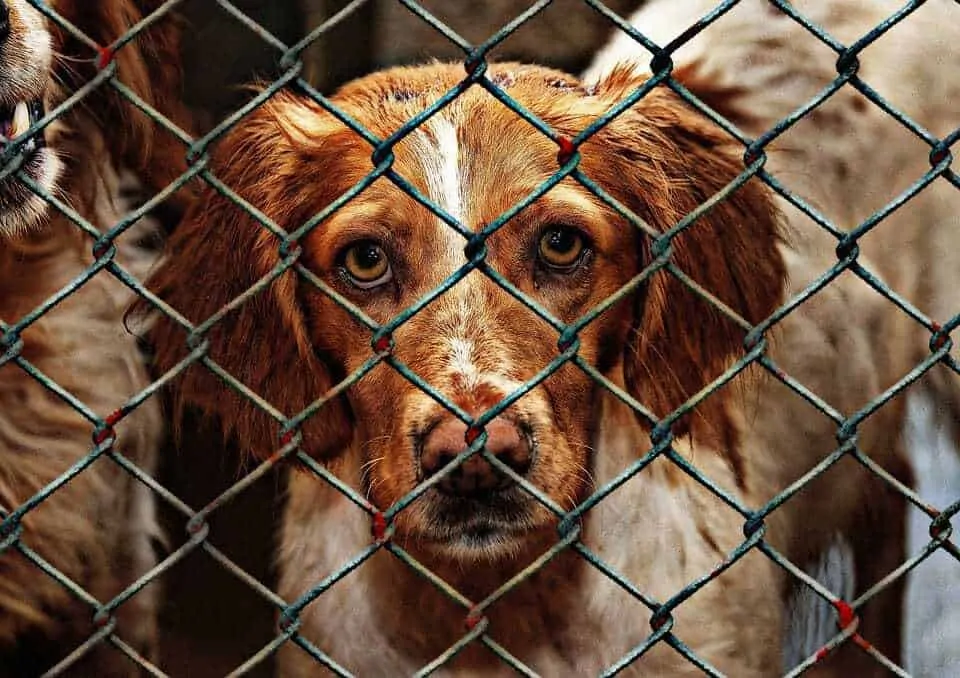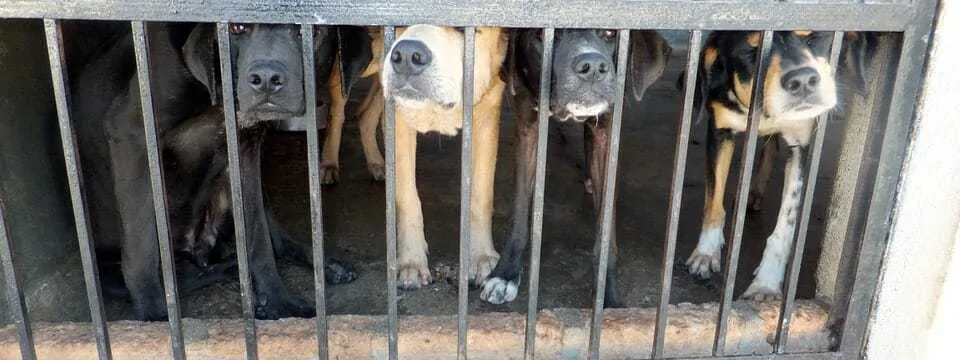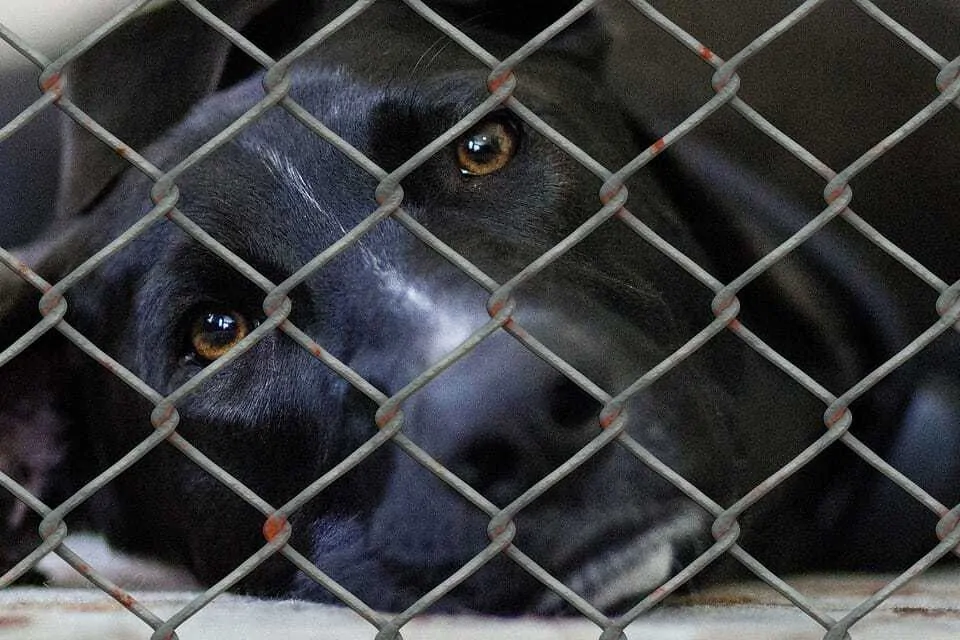There are so many reasons to adopt a pet – here we focus on those thinking about adopting a dog. Here are 13 reasons to adopt a dog. When I took on my first rescue dog Sam over 13 years ago, I could never have predicted the journey we would go on together.
He was not the easiest little lad. He had a lot of anxiety issues and this made him nervous around strange dogs and in new situations.
We had to do a lot of training and employ lots of management techniques to help him live a happy and relaxed life. He proved to be the starting point into igniting my passion for canine behaviour.
It was a roller coaster of a journey but he was just so loveable, misunderstood and full of character and I can’t imagine not having had the opportunity to share life with him.

This year I adopted Annie, a young Breton Spaniel that had a very tough start to life in Spain. She was extremely fearful when she first arrived but, with lots of human companionship, unconditional love and encouragement in a loving home, she has gradually come out of her shell and is now travelling around Europe with me. She is a fantastic travel buddy and has a very infectious zest for life.
I am a huge advocate for doggy adoption and whilst I do recognise that there will be times when people want to buy a puppy, I hope that this article will perhaps convince those on the fence to consider doggy adoption.
If you are buying a puppy PLEASE do your research, and then more, and then even more. It is so important to make sure that you go to a responsible breeder and see the puppy with mum and in a nurturing home environment.
Contents
1. Adoptions are so important – just look at the statistics
In the US alone, it is estimated that around 3.3 million dogs enter animal shelters every year! (figures provided by the ASPCA)
Surely, helping to reduce that number, even by just one, can only be a good thing. When you adopt a pet, you are saving a life in the process and giving the animal a second chance.
2. You will not be supporting Puppy Mills and their horrific conditions
Puppy farming with puppy mills is a huge industry. This is because it makes unscrupulous people a lot of money. Many people are unaware that the dog that they buy in pet stores or through an ad on Gumtree or Craigslist will likely be a puppy that has originated from one of these truly awful puppy mills.
According to the Humane Society, money is the driving force behind these often industrial scale breeding farms or puppy mills. There is no consideration for genetic issues or the well being of the parents or the puppies during a crucial phase in their lives at these puppy mills.
Many breeding adults in these breeding facilities are killed once they reach the end of their usefulness and the conditions they live in at the puppy mills can be extremely inhumane.
Puppies can be riddled with health issues, they are rarely vaccinated and they are often removed from their mother and littermates far too early.
The only way to guarantee you are not taking home a puppy mill dog is to see the conditions the pup is living in yourself and to see the pup with mum. So if you do want to buy a puppy, research is crucial.
Don’t support the Puppy Farming industry. Save a life – adopt instead from the Humane Society or a local shelter and help a dog in need. Even if you have your heart set on a particular breed, there are lots of breed specific rescues and animal shelters out there. Both my Cocker Spaniel Sam and my Breton Spaniel Annie were from rescue shelters.
Spanish Perreras are full of Brittany Spaniels, like my dog Annie, waiting for their forever home. Tragically, due to severe overcrowding and financial issues, many Perreras only hold dogs for 7 days and if they are not rehomed by then they will be euthanised
3. Helping your rescue dog overcome any issues can be extremely rewarding
Speaking from personal experience, seeing both Annie and Sam settle into life in their new home has been something that I found extremely heartwarming.
So, like with any new dog you bring home, you may find that there are challenges you need to overcome along the way post the adoption process. Your dog may have some behaviours that need to be worked on, they may have issues from having had a traumatic past. Don’t let this put you off. You could have issues with any dog that you bring home. Taking on a dog is a responsibility and you need to go into that commitment with your eyes open.
Poor Annie was terrified of pretty much everyone and everything when I first took her on. Her tail was always tucked between her legs and she didn’t like to move from her safe spots in the house. If new people came to visit she was petrified and it was even a challenge to get her to eat because she was so nervous.
It did require a lot of patience and training using positive reinforcement but, watching her gradually come out of her shell and develop a bond of trust with me was hugely rewarding. It makes all the work along the way so worth it!
Annie enjoying some home comforts
4. You may be saving more than one life
Not only are you providing a home to the dog that you are adopting, but you are also freeing up a spot in a shelter to make room for another dog in need.
Shelters can be overcrowded and can’t always take in every dog that they would want to. Some shelters are so short on space that they will make the decision to euthanise older, harder to rehome dogs to make room for others. Most of these dogs could still have had many happy years ahead of them in an adoptive home given the chance.
You may find rescues that work using foster homes have had to turn down a dog in need because they don’t have a foster spot available.
5. Because there are so many truly wonderful dogs waiting in Shelters right now
If you have never visited your local shelter, I am not going to lie, it can be an overwhelming experience. There is a lot of noise and many dogs that find the kennel environment extremely stressful.
You may see dogs barking frantically behind the bars of their kennel and think that they seem aggressive or too excitable. Usually, once these dogs are out of the kennel space they are completely different dogs. Most shelters have outside space to allow you to spend some time with a dog you may be interested in.
If you are considering adopting from a charity that uses foster homes, then the dog will have been assessed in a home environment. This can help with working out if you will be a good fit and they usually encourage you to have a meet and greet with the dog.
There are so many wonderful dogs just waiting to find their perfect home. Why not give them a chance?
Many shelters are overflowing with wonderfully deserving dogs looking for their forever homes
6. You don’t have to spend as much as you would buying a pedigree dog (and your donation goes to a good cause)
Adopting from a dog rescue is a lot less expensive than the cost of a pup from a reputable breeder. There are usually adoption fees but they will typically be at least half the cost of buying a pedigree dog. Rescue dogs are often already spayed and vaccinated too.
On top of all that you know that any money you are paying out is being donated to an extremely worthwhile cause.
Shelters are full of mutts and they often have much fewer health issues and live longer than pedigree breeds.
7. Adopting a senior dog may turn out to be more than you expect
There are so many senior dogs in rescue. A lot of them have been family pets for years and then as they become older, less mobile, less resilient, they are quite often so unfairly surrendered to shelters. Another common reason for the surrender of a senior dog is that the owners have just had a baby and they don’t have time for their loyal friend anymore.
Oldies can be wonderful companions. They often don’t need as much exercise, they are usually calmer around the house and they deserve to spend their golden years in comfort. Despite all this, older dogs often have a much harder time being adopted.
Don’t overlook the OAPs! Some rescues also provide extra financial back up for older dogs with medical issues.
Golden Oldies can be a wonderful addition to your family but they are often harder to rehome
8. Don’t forget black dogs are special too
For some reason, black dogs are often the hardest to adopt out in shelters. It is believed this largely relates to stigma and suspicion. It is so sad as it doesn’t relate to the dog’s temperament at all.
There are lots of super black dogs in rescue. Don’t overlook them!
Don’t overlook the black dogs in shelters – they make just as wonderful companions as dogs of any other colour!
9. A good rescue will help guide you to a dog that will be a good match
Most rescues do a wonderful job but the best ones provide you with more support and back up through the adoption process and beyond.
If a rescue is asking you lots of questions about your lifestyle and living arrangements, don’t be offended by this. They just want to make sure that they try to get as good a match as possible for you and the dog.
They will often help you consider things you may not have if you had been going out to buy a puppy just based on how cute they are or having met one you liked in the local park. For example, some breeds need a more active lifestyle and if you live in an apartment block and will not be able to do multiple long walks a day, then this type of dog may not be right for you.
A good rescue will also provide backup after adoption. This can be really useful if you do need some behaviour support.
10. You often don’t have to go through the inconvenience of house training
If you don’t like the thought of the house training phase, you may not have to worry about this with a rescue dog. A lot of them are adult dogs that are already fully house trained when they come to you. No puppy accidents to be cleaning up!
11. It feels good to be an adoption advocate
By offering a dog a forever home you are helping to promote dog adoption to a wider audience. You and your dog may help to convince someone else to take on a rescue dog. It feels good to be raising awareness about something so worthwhile.
12. Often people will say they don’t want to take on a shelter dog as they don’t know their background
Many dogs in rescue have extremely full histories. Even those that don’t though usually prove to be wonderful dogs with the right support along the way.
If you are extremely concerned, you could consider adopting a dog that has already been living in a foster home where they will have had time to assess how they are in a home environment.
Even if you purchase a puppy, if the pup has come from a puppy mill this also means you will not know their history. Puppies raised in mills have usually had an awful start. They will not have had proper socialisation, they may have been cruelly treated and they may have genetic health conditions or medical issues resulting from the poor conditions they have been kept in.
You are generally getting even more of an unknown with a pet store puppy than you will be with a rescue dog with little history.
13. Fostering can be just as rewarding
Don’t forget, if you can’t adopt or if you are not sure if you want to take that step yet, there are lots of rescues that look for temporary and long-term foster homes for dogs in their care.
Being the step between a dog being rescued and it going to its forever home can be a great experience.
You are giving the dog an opportunity to be assessed in a home environment, this will usually help their adoption prospects. It also means that you are saving the dog from having to stay in a more stressful kennel environment.
Often many people that decide to do this go on to become failed fosterers as they can’t bear to part with their furry companions.
Hope this list of reasons to adopt a pet will inspire you to adopt one yourself and save a life in the process.

Jen Jones is a professional dog trainer and behavior specialist with more than 25 years of experience. As the founder of ‘Your Dog Advisor’ and the ‘Canine Connection’ rehabilitation center, she applies a holistic, empathetic approach, aiming to address root causes rather than merely treating symptoms.
Well known for her intuitive and compassionate approach, Jen adopts scientifically-proven, reward-based methods, encouraging positive reinforcement over punishment. Jen specializes in obedience training, behavior modification, and puppy socialization. Her innovative methods, particularly in addressing anxiety and aggression issues, have been widely recognized. Jen has worked with many of the world’s leading dog behaviorists and in her free time volunteers with local animal shelters and rescue groups.




